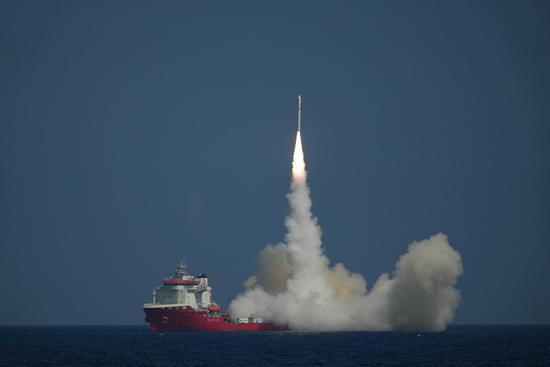China's big three State-owned oil companies reported significant increases in their net profits during the first half of the year, with analysts saying that the uptick was supported by stronger international crude prices and rising output.
China National Petroleum Corp, China Petroleum and Chemical Corp (Sinopec) and China National Offshore Oil Corp reported record production of oil and gas equivalent at 906 million barrels, 258 million barrels and 362 million barrels, respectively, during the first six months, up 1.3 percent, 3 percent and 9.3 percent year-on-year, the companies said.
This resulted in revenue increasing to 1.55 trillion yuan for CNPC, 1.58 trillion yuan for Sinopec and 226.77 billion yuan for CNOOC.
Net profits, meanwhile, reached 88.60 billion yuan for CNPC, 35.70 billion yuan for Sinopec and 79.73 billion yuan for CNOOC.
The three oil companies expect to better their business performance during the second half as China's economic growth trends upward, with domestic demand for refined oil products and natural gas projected to maintain growth and demand for chemical products gradually recovering.
Analysts said the overall improvement in business performance has been driven by both higher output as well as prices in the oil and gas sector.
Higher oil and gas output during the first six months is a result of stepped-up investments by the oil firms in domestic oil and gas exploration amid rising energy prices in recent years, which has further boosted their performance in light of recovering demand in the international crude oil market, said Wang Lining, director of the oil market department of the Economics and Technology Research Institute of China National Petroleum Corp.
According to a research report by Dongxing Securities, easing inflation in the United States has lessened the valuation pressure on commodities such as crude oil. As the domestic economy continues to recover, the demand for oil and gas exploration, refining and trade is also gradually increasing. Oil prices are likely to remain at mid-to-high levels in the future, driving profit growth.
Wang also said that in the context of a trend toward green development and low-carbon transition, it is necessary for the oil and gas majors to better integrate and develop new energy sources.
The oil and gas giants are laying out new energy-related plans as the country goes full throttle on its green energy transition to peak carbon emissions before 2030 and achieve carbon neutrality before 2060.
Sinopec, China's largest oil refiner, aims to become the country's top player in hydrogen, and is vigorously promoting the development of charging and gas networks, as well as advancing the steady development of hydrogen energy transportation.
CNOOC has been focusing on offshore wind power, using its expertise in drilling oil under the ocean floor.
CNPC has also vowed to further step up oil and gas exploration while actively forming new energy businesses throughout this year.
Zhu Yicong, vice-president of renewables and power research at global consultancy Rystad Energy, said even as the three major oil and gas companies' main sources of revenue are oil and gas-related sectors, all three have been proactive in moving toward a cleaner and greener portfolio.
"All three companies have recognized and utilized their unique strengths to differentiate their renewable development focuses for their respective renewable portfolio to fit in with the broader company portfolio," she said.
"CNOOC, with decades of experience in offshore exploration and operation, has put more focus on the development of offshore wind as well as the integration of offshore wind and offshore oil and gas operations," Zhu said.
"As offshore wind development moves in further from shore and deeper water areas with increasing difficulty of construction and capital expenditure, being able to utilize its existing offshore engineering capabilities, and potentially transmitting power directly to nearby oil and gas platforms gives CNOOC an advantage in developing offshore wind compared to others."


















































 京公网安备 11010202009201号
京公网安备 11010202009201号